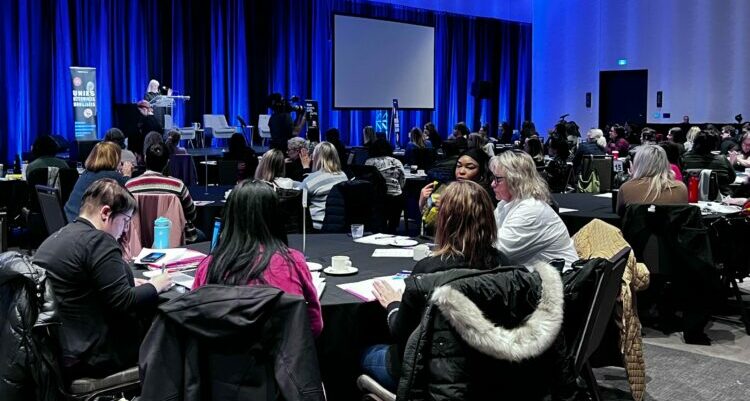
Activism and feminism: feeding the fire
“Female solidarity is never frivolous; it’s always political,” wrote author Pauline Harmange. This observation sums up the essence of the last Women’s Network nicely. When we mix the words– together, involvement, boldness, action, solidarity, sisterhood–that is when we can hope to make change in society.
Why should we continue to invest our time and energy in a feminist cause? Because there is still inequality between women and men, and among women themselves, and because only collective action can change discriminatory situations for the better. History has shown us time and time again, the future will demand it.
In the union world, as in Quebec society, mainly women have worked toward gender equality. And it was because union activists dared to speak up, denounce, and make demands that we have made important gains. The history of female Quebec unionism is hard to separate from the history of the women’s movement, and vice versa. As professor Francine Descarries (speaker at the last Women’s Network) said so well, “alliances were crucial to obtaining recognition of the issues that specifically affected women.”
Just think of the fundamental right of pay equity, the creation of a public and accessible daycare network, or the recognition of the importance of financial security during a parental leave (creation of the Québec Parental Insurance Plan, QPIP), feminist, community and union groups waged these battles. As such, the notion of “together” becomes an essential part of understanding and analyzing advances. The fight for the right to have an abortion in Quebec is a prime example of the sisterhood that took shape around Chantale Daigle’s situation in the late ‘80s.
“No pope, spouse, judge or doctor!” chanted over 10,000 women in the streets of Montreal in July 1989 as they fought for the right to choose to have an abortion. A few weeks earlier, Chantale Daigle, a 21-year-old woman pregnant with a violent spouse’s child, had just had her right to have an abortion taken away from her twice with two consecutive injunctions.
This historical demonstration was organized by mobilized and engaged women, members of the Coalition pour l’avortement libre et gratuit. In parallel to the public denunciation, a private feminist action was being organized to support Chantale Daigle in her choice to get an abortion since she was consequently obliged to go to the United States to get one. Even though a request was submitted to the Supreme Court to withdraw the injunction, time was tight. Thanks to women’s solidarity and courage, Chantale Daigle was able to get an abortion despite an ongoing legal battle. This battle was finally won with a ruling in the Supreme Court of Canada. The ruling stated that only a person has constitutional rights and these rights start at the time of live birth. Consequently, a foetus does not have the legal status of a person and a father has no ownership rights over a foetus.
From female engagement to feminist engagement
Female activism can take all kinds of forms: union, community, university and even citizen activism. How much mobilization started around a cup of tea in a kitchen? In 1974, the Théâtre des cuisines was created. It’s a theatre company that stemmed from the feminist movement for the recognition of women’s rights and the questioning of social roles. Still today it is an active theatre involved in various communities!
Countless ideas have come from women meeting in a living room or a park! In fact, that is how the citizen organization “Ma place au travail” originated, from women talking about a common and discriminatory reality: the lack of spots in daycares. From a meeting came an idea, and from an idea, an action: denouncing and fighting against an unjust situation that contributes to the financial insecurity of women. Thousands of women were in the same situation and when they joined their voices, a provincial mobilization was born.
Union and feminist battles are not only important for all of society, but inseparable from major social victories. Spheres of activism are still interrelated, and the feminist movement and union movement are at the heart of major gains for women.
Sisterhood is the expression of female and inclusive solidarity. It is a method of resistance and it is essential to collective battles, without which, things just wouldn’t change.
